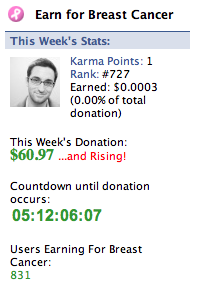 I don’t usually write about Facebook applications — there are tens of thousands of them, and few gain or maintain significant traction. But, Social Change is worth a mention because it has an interesting business model. Built by Dank Apps, Social Change is a set of vertical applications based around certain causes, like curing breast cancer or AIDS, or stopping climate change.
I don’t usually write about Facebook applications — there are tens of thousands of them, and few gain or maintain significant traction. But, Social Change is worth a mention because it has an interesting business model. Built by Dank Apps, Social Change is a set of vertical applications based around certain causes, like curing breast cancer or AIDS, or stopping climate change.
These applications generate advertising money that is then donated to the cause in question. New York-based Dank Apps, of course, is a for-profit business and its bigger plan for making money is directing users of Social Change applications to another application, Lotto. More on that in a second.
After users add one of the applications, they can gain “karma points” by inviting friends, sending gifts, and other actions on the app — really, anything that keeps the user active. Dank Apps donates a couple cents to a charity every time an application is installed, then donates more money based on how lucrative the application is, with “karma points” roughly translating to the amount that Dank Apps donates.
June 5th: The AI Audit in NYC
Join us next week in NYC to engage with top executive leaders, delving into strategies for auditing AI models to ensure fairness, optimal performance, and ethical compliance across diverse organizations. Secure your attendance for this exclusive invite-only event.
The apps are focused on verticals that are attractive to higher-end advertisers and brand sponsors and so generate relatively high CPM advertising. Because the apps are places where users can both talk about causes and make money for the causes, the usage rates are relatively high (although the apps themselves just launched, and only have a handful of users).
As Nick O’Neill of All Facebook points out, others have tried variations of this strategy without success but were more complicated; one erstwhile competitor required a download toolbar, for example.
Lotto, Dank Apps’ other Facebook application is already cash-flow positive. Instead of a real-life lottery, where you pay to play, you invite your friends and take other actions in order to earn tickets (not unlike Social Change’s “karma points”). But Lotto only has a few thousand active users because, as Dank Apps founder Jason Beckerman tells me, it’s difficult for users to understand that it’s free just through receiving an invite. By advertising Lotto through its other applications, Beckerman hopes to see a significant new wave of users eventually playing Lotto.


